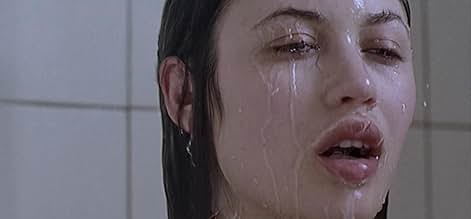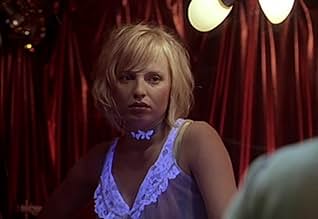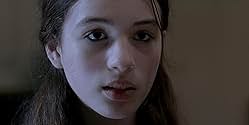IMDb RATING
6.1/10
1.3K
YOUR RATING
Iris finds a new job working in a preservation lab where she gradually enters into a troubled relationship with her boss.Iris finds a new job working in a preservation lab where she gradually enters into a troubled relationship with her boss.Iris finds a new job working in a preservation lab where she gradually enters into a troubled relationship with her boss.
- Awards
- 1 win & 2 nominations total
Louis Dewynter
- L'enfant
- (as Louis de Winter)
Anja Gräfenstein
- La prostituée
- (as Anja Boche)
- Director
- Writers
- All cast & crew
- Production, box office & more at IMDbPro
Featured reviews
SO..... WHAT'S WRONG WITH THIS PICTURE???
Haunting musical score, disturbingly unsettling erotic scenes, perturbing voyeuristic encounters, Olga Kurylenko as eye candy, preserve-and-cherish-those-best-moments-of-your-life metaphors, artistic and interesting visuals...
Put all these diverse elements into a cinematic blender and what do you get? A Film-Making 101 textbook example of the total being LESS than the sum of its parts! I've been asking myself the "What the H*LL is this?" question incessantly for hours since spending 90 minutes as a "voyeur" of this experiment. And...As yet, there just doesn't seem to be an answer!
The director, Diane Bertrand, seems to be assiduously and blatantly giving us the title (sans "Ring") for the duration! The film revolves around a mysterious "clinic" where people go to have important life-relics "preserved"...In theory, at least. In practice, these supposedly priceless articles are soon forgotten about. It's difficult to empathize with any of the characters in the film because they're all so creepy, to one extent or another. Even Kurylenko's character is more off-putting than not.
The supposedly "erotic" scenes are reminiscent of watching someone getting violated by their orthodontist during a root canal procedure. A rather self-indulgent piece of film-making, it's not hard to imagine dozens of Director Bertrand's friends gathered at her home for a private screening shouting "C'est Magnifique!" and "Incroyable!" afterward! As if this weren't enough, many segments are painfully languidly paced.
"FINGER" might have faired a little better after a second viewing, but I'm not motivated in the least to see it again.
3***........ ENJOY! / DISFUTELA!??!?...(If You Can Manage!)
Any comments, questions or observations, in English o en Español, are most welcome!
Haunting musical score, disturbingly unsettling erotic scenes, perturbing voyeuristic encounters, Olga Kurylenko as eye candy, preserve-and-cherish-those-best-moments-of-your-life metaphors, artistic and interesting visuals...
Put all these diverse elements into a cinematic blender and what do you get? A Film-Making 101 textbook example of the total being LESS than the sum of its parts! I've been asking myself the "What the H*LL is this?" question incessantly for hours since spending 90 minutes as a "voyeur" of this experiment. And...As yet, there just doesn't seem to be an answer!
The director, Diane Bertrand, seems to be assiduously and blatantly giving us the title (sans "Ring") for the duration! The film revolves around a mysterious "clinic" where people go to have important life-relics "preserved"...In theory, at least. In practice, these supposedly priceless articles are soon forgotten about. It's difficult to empathize with any of the characters in the film because they're all so creepy, to one extent or another. Even Kurylenko's character is more off-putting than not.
The supposedly "erotic" scenes are reminiscent of watching someone getting violated by their orthodontist during a root canal procedure. A rather self-indulgent piece of film-making, it's not hard to imagine dozens of Director Bertrand's friends gathered at her home for a private screening shouting "C'est Magnifique!" and "Incroyable!" afterward! As if this weren't enough, many segments are painfully languidly paced.
"FINGER" might have faired a little better after a second viewing, but I'm not motivated in the least to see it again.
3***........ ENJOY! / DISFUTELA!??!?...(If You Can Manage!)
Any comments, questions or observations, in English o en Español, are most welcome!
This little gem was Olga Kurylenko's (Quantum of Solace, Hit-man, Paris, je t'aime) first film. That is the only thing that attracted me to it. She has a beauty that just draws you in no matter what she stars in.
She has to do a lot of acting in this film, as it is short on dialog. She injures herself in an industrial accident and ends up in a situation with a strange man in a strange job, and sharing a room with a sailor who works nights. The only interaction with the sailor is through what he leaves in the room, but the relationship with her boss takes on an erotic turn.
Despite the absolutely awesome display of femininity by Kurylenko in the musical and visual feast, there just wasn't enough story to carry this all the way.
She has to do a lot of acting in this film, as it is short on dialog. She injures herself in an industrial accident and ends up in a situation with a strange man in a strange job, and sharing a room with a sailor who works nights. The only interaction with the sailor is through what he leaves in the room, but the relationship with her boss takes on an erotic turn.
Despite the absolutely awesome display of femininity by Kurylenko in the musical and visual feast, there just wasn't enough story to carry this all the way.
The sexy Ukrainian Bond-babe (from Quantum of Solace) Olga Kurylenko's first film was L'Annulaire (2005) . Iris (Kurylenko) have an accident and cut off her ring finger. Then she moves to a port town (filmed in Hamburg), and lodging in a hotel by the seafront. She gets a job as an assistant and receptionist for a man who preserve peoples specials items into specimen. The guy and the place is weird, and he comes up with some requirements to her, that makes the job and employer even weirder. It's originally a Japanese novel by Yoko Ogawa, and there is some strange Japanese atmosphere over this story. The movie is packed with the nude Iris, and I guess that alone will please a lot of male viewers. I think the story was going a bit empty after a while, but I'm a male viewer - so I stayed tune with the beautiful Iris until the final.
There were a lot of things I enjoyed about this movie. The cover, the synopsis and the concept were really the high points. The lead actress was quite good as well (not bad to look at too). I mean the cinematography was good I guess, but nothing to out the ordinary. I mean you can't rely on gritty filters and a softened colour palate to carry a movie. The concept for this movie really intrigued me and I had begged my friends to rent it a couple times by the cover(instead of "Poisidon" and "When a Stranger Calls"). Just it seemed to me that it was trying too hard to be something and wasn't focusing enough on characters actual motivations and any connection with the real world. "Who is this girl?" is what I'm sure would have been the question if I had convinced anyone I know to watch it with me.
Don't bother. Heard its hard to find so should be a problem for most people.
Don't bother. Heard its hard to find so should be a problem for most people.
A city with no name, a young woman with no history, a house apart - a strange island in a sea of trees. I like the lack of references to anything external to this system. The world of this movie is airtight. I'm reminded of the famous story retold by W. Somerset Maugham, "Appointment in Samarra", where a man, upon bumping into Death in the streets of Baghdad, flees to Samarra to avoid his wrath, but instead runs into Death who is waiting for him in Samarra, and whose anger at the jostling in Baghdad is revealed to have been mere surprise, as he had been expecting to see the man in Samarra later in the day. The sealed nature of this film demands a focus on inevitability.
A young woman, Iris, wanders alone in the port area of the city, along superannuated towpaths, past the gigantic hulks of international shipping; outside of work the closest she comes to really being with others is staring at prostitutes behind plate glass, or contemplating entering a bar. There's something brutal about the isolation of Iris by the filmmaker. When I reviewed In The City of Sylvia, similarly a beautiful movie with an isolated character, I said that the filmmaker should either have won the Golden Lion at Venice or have been brutally murdered; I've similar feelings here.
Today is Sunday and I've been sat in a deserted office building writing this review, ostensibly here to study for exams, but procrastinating somewhat. The morning streets are almost empty, a white contrail hints at faraway adventures that I'll never be part of, the river is full of empty boats. There is nothing good about being alone; the beauty of it is only a subtle form of cruelty.
The soundtrack of the movie is done by Beth Gibbons of Portishead; its fractured entropised lilt is just right; you only ever catch fragments of lyrics.
Iris gets work as the sole employee in the strange set aside laboratory. The laboratory offers a simple service whereby people may come and, for a fee, have items preserved and stored away. This seems quite a perverse thing to do. Memory, which it seems this film is about, IS perverse. Recently I wrote three poems to a woman I love, who I later learnt has no desire to be with me, I never gave them to her. A colleague tells me I should burn them, and that is perhaps the best thing to do, but perversity wills me to preserve them, to torture myself. Memory becomes viscous ooze in which you are trapped, finally it solidifies and turns into amber. People (mostly children) who can live in the moment, truly do not know how lucky they are.
Some have called the film erotic, however the erotic whilst present, is as intangible as a passing cloud on a sunny day. Marc Barbé's conserver remains inscrutable and devoid of passion during sex scenes. Sex scenes with him are no more or less sensual than seeing a spider cocooning a fly, trapped for inclusion in its larder. One quite disturbing picture from above shows us an image of his head on Iris' body, he is merely consuming her.
Other aspects of the erotic are fetishistic, the focus on the shoes that Iris is made to wear for her work, her clothing, which the sailor who sleeps in her room in the morning feels and smells in her absence. The movie brought to mind for me Magritte's two famous fetishistic paintings, The Red Model, and Philosophy in the Boudoir, both of which show clothing suggesting the female form. (Philosophy in the Boudoir also came to mind during In The City of Sylvia).
Mahjong came into play as it does in all good surreal movies (cross-reference to Robbe-Grillet's The Blue Villa). You could if you want see Iris as a flower tile, and the laboratory door as the white dragon tile (which is a blank tile in Mahjong, or blankness with a rectangular border). These are symbolic, but I don't want to spoil the movie by mentioning how.
Do not watch this movie, arrange to have all copies burnt!
A young woman, Iris, wanders alone in the port area of the city, along superannuated towpaths, past the gigantic hulks of international shipping; outside of work the closest she comes to really being with others is staring at prostitutes behind plate glass, or contemplating entering a bar. There's something brutal about the isolation of Iris by the filmmaker. When I reviewed In The City of Sylvia, similarly a beautiful movie with an isolated character, I said that the filmmaker should either have won the Golden Lion at Venice or have been brutally murdered; I've similar feelings here.
Today is Sunday and I've been sat in a deserted office building writing this review, ostensibly here to study for exams, but procrastinating somewhat. The morning streets are almost empty, a white contrail hints at faraway adventures that I'll never be part of, the river is full of empty boats. There is nothing good about being alone; the beauty of it is only a subtle form of cruelty.
The soundtrack of the movie is done by Beth Gibbons of Portishead; its fractured entropised lilt is just right; you only ever catch fragments of lyrics.
Iris gets work as the sole employee in the strange set aside laboratory. The laboratory offers a simple service whereby people may come and, for a fee, have items preserved and stored away. This seems quite a perverse thing to do. Memory, which it seems this film is about, IS perverse. Recently I wrote three poems to a woman I love, who I later learnt has no desire to be with me, I never gave them to her. A colleague tells me I should burn them, and that is perhaps the best thing to do, but perversity wills me to preserve them, to torture myself. Memory becomes viscous ooze in which you are trapped, finally it solidifies and turns into amber. People (mostly children) who can live in the moment, truly do not know how lucky they are.
Some have called the film erotic, however the erotic whilst present, is as intangible as a passing cloud on a sunny day. Marc Barbé's conserver remains inscrutable and devoid of passion during sex scenes. Sex scenes with him are no more or less sensual than seeing a spider cocooning a fly, trapped for inclusion in its larder. One quite disturbing picture from above shows us an image of his head on Iris' body, he is merely consuming her.
Other aspects of the erotic are fetishistic, the focus on the shoes that Iris is made to wear for her work, her clothing, which the sailor who sleeps in her room in the morning feels and smells in her absence. The movie brought to mind for me Magritte's two famous fetishistic paintings, The Red Model, and Philosophy in the Boudoir, both of which show clothing suggesting the female form. (Philosophy in the Boudoir also came to mind during In The City of Sylvia).
Mahjong came into play as it does in all good surreal movies (cross-reference to Robbe-Grillet's The Blue Villa). You could if you want see Iris as a flower tile, and the laboratory door as the white dragon tile (which is a blank tile in Mahjong, or blankness with a rectangular border). These are symbolic, but I don't want to spoil the movie by mentioning how.
Do not watch this movie, arrange to have all copies burnt!
Did you know
- How long is The Ring Finger?Powered by Alexa
Details
Box office
- Gross worldwide
- $17,395
Contribute to this page
Suggest an edit or add missing content


























